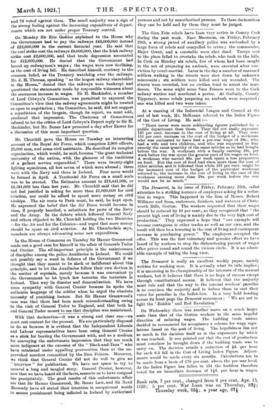On Monday Sir Eric Geddes explained to the House why
the Government had to pay the railways fi43,000,000 instead of A22,000,000 in the current financial year. He said that the coal strike cost the railways £8,000,000, that the Irish railway strike cost £2,000,000, and that trade depression accounted for £12,000,000. He denied that the Government had forced up railwaymen's wages ; the wages were now declining, as the cost of living fell. He described. himself, contrary to the common belief, as the Treasury watchdog over the railways. Mr. J. H. Thomas, speaking " as the largest railway shareholder in the House," denied that the railways were bankrupt and questioned the statements made by responsible witnesses about the enormous increase in wages. Sir H. Malikincler, a member of Lord Colwyn's Committee, was permitted to expound the Committee's view •that the railway agreements might be treated as open to negotiation ; the Committee, he said, did not suggest a repudiation of the bargain, though its report, we must add, produced that impression. The Chairman of Committees refused to let the critics of Lord Colwyn's Report reply to Sir H. Mackinder, but Mr. Boner Law promised a day after Easter for a discussion of this most important question.


































 Previous page
Previous page